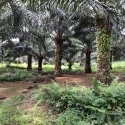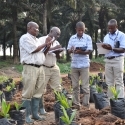28 Jul 2015
Oil Palm Project Overview
 Catena field trial
Catena field trial
The Oil Palm (OP) project was initiated in 2012, during which time oil palm yields in Ghana were rapidly declining despite an immense increase of area under cultivation over the past 10 years and a large demand for palm oil. The main focus of the project therefore is to develop and disseminate knowledge on sustainable yield intensification in oil palm plantations in Ghana. This was done by identifying and implementing ‘Best Management Practices (BMPs)’ that meet site-specific needs in order to intensify yields. Other components of the Ghana BMP project involve quantifying yield gaps caused by nutritional and water deficiencies, two of the major constraints in oil palm production in Ghana. In order to understand these yield gaps, several trials were established in three oil palm plantations including a fertilizer, irrigation, and soil moisture assessment (catena) trial.
The BMP project has made excellent progress, with good support from the management and field staff at all three plantations. It is clear that the plantations have increased their capacity and knowledge on BMP intensification practices, and have embraced its components in the overall plantation management scheme.The project has focused on identifying and then rectifying management practices that cause yield gaps. Attention was particularly placed on field maintenance issues related to drainage, soil conservation, woody weed removal and nutrient management. Additionally, fertilizer response and irrigation trials have been established to gain insights on effective management practices to reduce water and nutrient limited yield gaps. The BMP work over the past two years has shown good potential to increase yields, with average yields across all plantations increasing by 2.4 t ha-1 to 13.4 t ha-1 (+22%), which is partly due to higher crop recovery after the installation of proper access. Yields are expected to increase further by the end of 2016 due to the implementation of an improved nutritional program in the BMP blocks.








